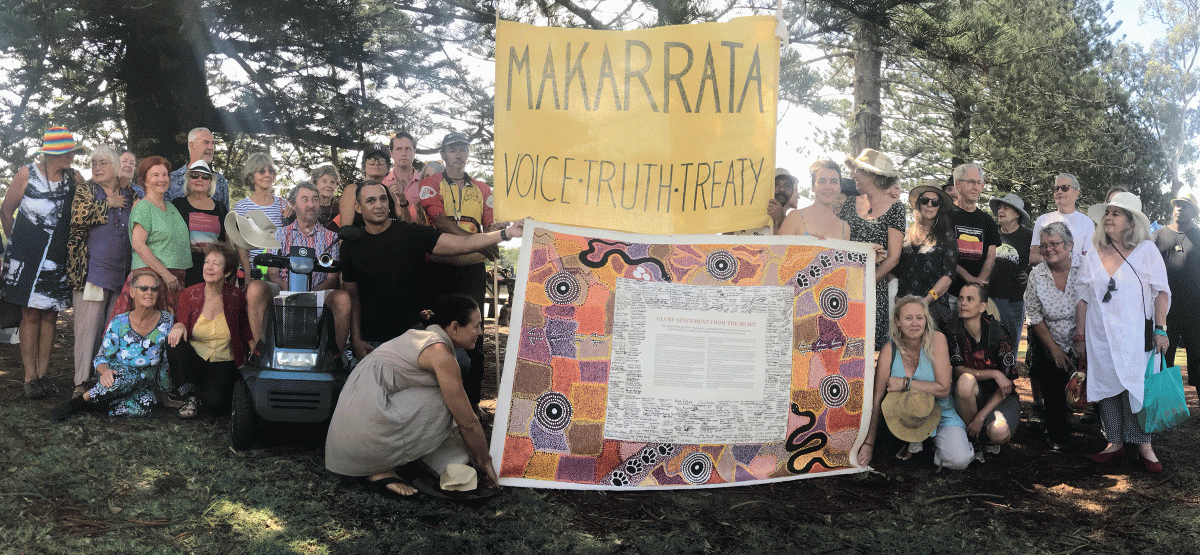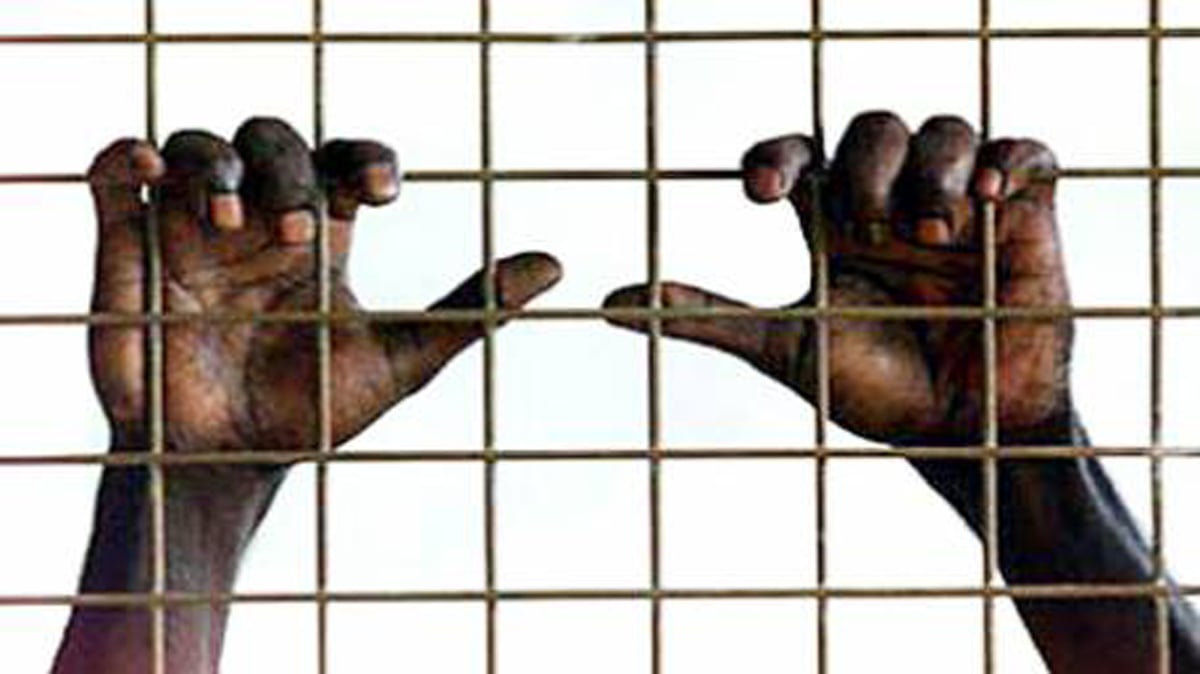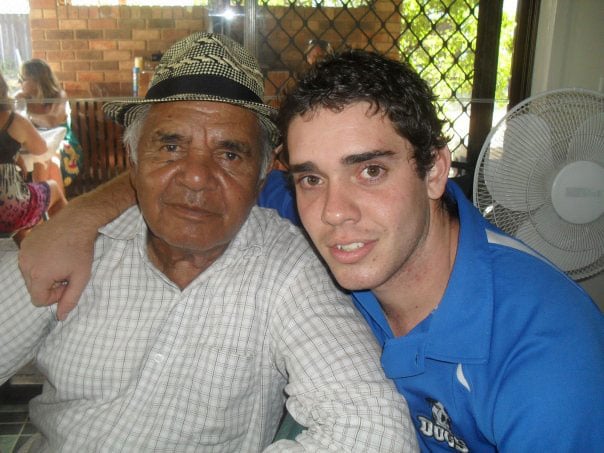

♦ Budgeram means story in Bundjalung language.
How non-indigenous people can support a Makarrata
Louise Togo
The Uluru Statement from the Heart seeks constitutional reform to empower Aboriginal and Torres Strait Islander peoples to have a say and be involved over matters that impact their lives. What that means is that Aboriginal and Torres Strait Islander people are seeking an enshrined voice that is protected in the constitution.
The true history of colonisation and the impact that it has had on our First Nations peoples has often been kept out of the history books or romanticised by missionaries promoting the idea that Indigenous people were a ‘dying race’ and it was their place to help ‘smooth the dying pillow’. They believed that eventually Aboriginal people would be ‘bred-out’ and those remaining would ‘assimilate’ into mainstream society.

Aboriginal and Torres Strait Islander people have never lain silent on matters that have affected them personally, in community, in the state, or nationwide. While the echoes of injustice have so often fallen on deaf government ears, the fight and our voices have continued; they have changed and developed, and become stronger.
Since colonisation, Aboriginal and Torres Strait Islander peoples have been advocating for self-determination and a rightful place both within Australian history and Australia’s future.
Throughout generations of advocacy, while the laws and policies have negatively impacted Indigenous culture, it has not put out the fire for justice for Australia’s First Nations people – it has only made the fight and the call for recognition of constitutional rights stronger.
Makarrata
So, while the struggle for an Indigenous voice is not new, the Uluru Statement from the Heart document is.
In 2017, the Uluru Statement from the Heart invited all Australians to walk with us, Aboriginal and Torres Strait Islander peoples, in a movement of all the Australian people for a better future. A monumental step. It acknowledged in this statement that it would take all Australians, standing united, to affect change; it recognised that it was not possible without all Australians walking in this journey together.
The Uluru statement outlines a Makarrata commission to supervise a process of agreement-making between government and First Nations and includes truth-telling about our history.
Makarrata is a Yolngu word that describes a process of conflict resolution, peacemaking and justice.
The Uluru Statement from the Heart is a rallying call. In its passages it echoes the Indigenous voices of the past, it recognises that sovereignty was never ceded, and makes clear that it is time to correct wrongs through a process of truth-telling. It will take the power of all Australians to do this.

In 2019 I attended a Politics in the Pub event in Mullumbimby hosted by the Ngara Institute when Thomas Mayor was speaking about the Uluru Statement At that time, I had only heard about the statement and of course it was the NAIDOC Theme that year; VOICE, TREATY, TRUTH.
My understanding in 2019 was very limited, but after listening to Thomas Mayor speak I was inspired to seek the truth. I have now read many books, reports, and spoken to many people about the Uluru Statement. When confident in this knowledge I helped found the Northern Rivers Uluru Statement Supporters group.
I decided that I was going to use my voice, my platform, to advocate for change, and this is how I was going to do it; I was going to be an ‘ally’.
Support from the heart
There are a few simple ways for non-indigenous people to support the Uluru Statement from the Heart and be a good ‘ally’. It’s all about education and the willingness to seek that education with an open heart and understanding.

I say this because becoming an ‘ally’ is about unlearning your truth and what you have been taught about Aboriginal and Torres Strait Islander people and learning a new narrative.
We can no longer be like our government who, in its own fragility, have been unwilling to support an acknowledgement and a recognition of First Nations people. We must take the stance that our governments have failed in for so long.
It can be extremely difficult, but it is time for all Australians to acknowledge and support a First Nations narrative that comes from a place of truth.
Become good allies
To Support the Uluru Statement from the Heart and become good allies can be as easy as the following:
- Read the Uluru Statement from the Heart ( www.fromtheheart.com.au)
- Discuss and share the statement with your family, friends, and co-workers.
- You can sign the Digital Canvas.
- Join a local Uluru Statement from the Heart supporters’ group on social media.
- Discuss the statement with your workplace and support the Statement by placing a copy of it in your office, and by including it as part of your reconciliation action plan.
- And finally… walk with us in a movement of the Australian People for a better future.
Author
Louise Togo is a Saltwater woman living on Coodjinburra Kuntri.
Louise has worked in Indigenous education for the past 20 years, both in the classroom and mentoring youth helping to create pathways.
Louise local advocate for the Uluru Statement from the Heart.
Further Information
1. Blood on the Wattle – Massacres and Maltreatment of Aboriginal People since 1788.
2. Finding the Heart of the Nation. Thomas Mayor
3. www.fromtheheart.com.au
4. SBS Series The First Australians.
5. The Final Report of the Referendum Council 2017
6. www.referendumcouncil.org.au
More Storylines articles
Invasion Day – time to create unity through recognition and justice
As 26 January approaches our communities are once more gripped by polarised views of the date.
If not now then when?
In 1901, when Australia’s Constitution was originally determined, there was no direct mention of First Nations people. In fact, it was designed to deliberately exclude us.
The moment we can change the course of history
For decades, Aboriginal and Torres Strait Islander people have been campaigning for change to the current political system in Australia. Many incremental changes have led us to this moment in history...
Storylines – The Voice, it’s time
For generations, First Nations people have consistently and persistently pointed to self-determination as being essential in making meaningful difference in the lives of our people.
Storylines – Upcycle the festive season
♦ Budgeram means story in Bundjalung language. Here comes Christmas, the festive season; the year is drawing to a close and we put the icing on the year with the biggest celebration in our collective calendar. For many it’s a problematic time...
Storylines – Boomalli Aboriginal Artists Co-operative
♦ Budgeram means story in Bundjalung language. Thirty-five years ago, ten Aboriginal artists gathered to create an Aboriginal Artists Co-operative in Sydney, the place of first point of contact with the English in 1788, when Captain Cook proclaimed that the land was...
Storylines – Belonging places
Belonging is a feeling of security and support we experience when we experience a sense of acceptance and inclusion in community. Belonging is a sense of being connected to something greater
Storylines – Working with mob
Many are asking ‘who do I talk to?’ if I want to work with mob? Taking the time to yarn, engage and build relationships is key.
Storylines – The Voice of the voiceless
My grandfather would often tell me a story. A story about a community. This community was self-sufficient, self-reliant, and self-determining of their own lives.
Storylines – Returning to old ways of housing
Kinship and Country obligations for mob resulted in bands, or groups of families living together and sharing everyday life, prior to colonisation.















The Uluru Statement from the Heart to a Federal Government that has no heart or soul.
First up we need to get rid of this impossible government in order for The Uluru
Statement from the Heart to thrive.
Stefanie, very true but Morrison’s Mushrooms aka his Comatosed Australians just don’t give a toss about the rubbish governing that is being delivered. How else does one explain his polling numbers – if the polls can be believed anymore after the 2019 election result.